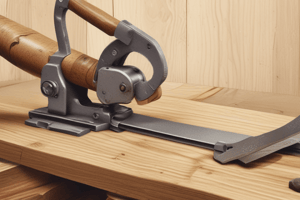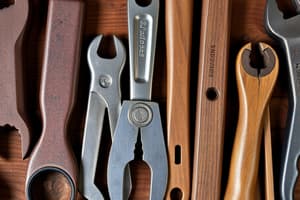Podcast
Questions and Answers
What is the primary purpose of a basting stitch?
What is the primary purpose of a basting stitch?
- To reinforce the edges of a garment.
- To create permanent stitches in fabric.
- To hold fabric in place temporarily. (correct)
- To provide decorative elements to clothing.
Which sewing technique is specifically used for creating curved edges?
Which sewing technique is specifically used for creating curved edges?
- Corner sew
- Basting stitch
- Curve sew (correct)
- Straight sew
In what context would you use the corner sew technique?
In what context would you use the corner sew technique?
- To sew hems in a garment.
- To shape the edges of a neckline.
- To handle corners of pillowcases and garments. (correct)
- To attach various pieces of lace.
What does the term 'raveling' refer to in sewing and fabric contexts?
What does the term 'raveling' refer to in sewing and fabric contexts?
What is the definition of 'notches' in sewing?
What is the definition of 'notches' in sewing?
Which stitch is primarily used for sewing fabric edges to prevent raveling?
Which stitch is primarily used for sewing fabric edges to prevent raveling?
What is a characteristic feature of the running stitch?
What is a characteristic feature of the running stitch?
Which of the following stitches is commonly used for outlining in embroidery?
Which of the following stitches is commonly used for outlining in embroidery?
In which situation would you primarily use a whip stitch?
In which situation would you primarily use a whip stitch?
Which stitch is known for its flowing texture and twisted appearance?
Which stitch is known for its flowing texture and twisted appearance?
What distinguishes the blanket stitch from other stitches?
What distinguishes the blanket stitch from other stitches?
When sewing a folded hem, which stitch is most suitable?
When sewing a folded hem, which stitch is most suitable?
Which type of stitch is specifically designed for creating diagonal patterns across the fabric?
Which type of stitch is specifically designed for creating diagonal patterns across the fabric?
Flashcards
Basting stitch
Basting stitch
A temporary stitch used to hold fabric together before permanent stitching.
Straight sew
Straight sew
A stitch made by a sewing machine, traveling in a straight line, using the presser foot as a guide.
Corner sew
Corner sew
Sewing a corner by stopping the needle, turning the fabric, and continuing to stitch.
Knitting
Knitting
Signup and view all the flashcards
Needle lace
Needle lace
Signup and view all the flashcards
Running Stitch
Running Stitch
Signup and view all the flashcards
Blind/Slip/Ladder Stitch
Blind/Slip/Ladder Stitch
Signup and view all the flashcards
Catch/Herringbone Stitch
Catch/Herringbone Stitch
Signup and view all the flashcards
Back Stitch
Back Stitch
Signup and view all the flashcards
Stem Stitch
Stem Stitch
Signup and view all the flashcards
Blanket Stitch
Blanket Stitch
Signup and view all the flashcards
Buttonhole Stitch
Buttonhole Stitch
Signup and view all the flashcards
Whip Stitch
Whip Stitch
Signup and view all the flashcards
Study Notes
Hand Stitches
- Hand sewing is used to permanently stitch fabrics together by hand
- Stitches are fundamental elements in sewing, knitting, crochet, needle lace making, and more
Types of Stitches
- Running stitch: A basic stitch used as a base for other stitches. It involves passing the needle in and out of the fabric at regular intervals.
- Blind/Slip/Ladder stitch: A hidden stitch for folded edges like hems, passing the needle inside the fold repeatedly
- Catch/Herringbone stitch: A large uneven stitch used to finish seams and hems, mainly on thick materials
- Back stitch: A stitch formed by sewing backward one stitch then forward two on the fabric to create visible stitch lines on both sides.
- Stem stitch: A hand embroidery stitch with a twisted look creating a flowing texture, it is different from backstitch.
- Blanket stitch/Cable stitch/Crochet stitch: Used to reinforce the edges of thick materials
- Buttonhole stitch: Used to secure buttonholes, sew eyelets, attach appliques, and in couching stitches
- Whip stitch: A stitch with the needle circling an edge repeated multiple times
- Cross stitch: Stitches in rows left to right, then diagonal stitches to the upper corners to create a cross
- Chain stitch: Insert the needle and bring the thread under the tip before pulling the needle through the fabric.
- Fly stitch: Hand embroidery technique for isolated stitches, straight lines, or curves
- Basting stitch: A temporary stitch used to hold fabric in place until a permanent stitch is added
Sewing Machine Exercises
- Straight sew: An exercise to control the sewing machine and create straight lines. Utilizes the presser foot as a guide.
- Corner sew: An exercise useful for sewing corners on garments, involves turning the needle on fabric before repositioning the fabric.
- Curve sew: Helps create curved seams needed in necklines, collars, sleeves, and pockets. Slowing down the sewing machine helps maintain accuracy.
Definitions
- Knitting: Used for creating garments by hand or machine.
- Crochet: A technique using a hook to create fabrics, originating from the French word croche (hook), used in lace-making.
- Needle lace: Lace made using a needle and thread to create patterned stitching.
- Hems: Folded edges stitched to prevent fabric from unraveling.
- Ravelling: A fraying or unraveling thread from fabric.
- Notches: Triangular shapes or slashes added to seams for placement guide.
Studying That Suits You
Use AI to generate personalized quizzes and flashcards to suit your learning preferences.




